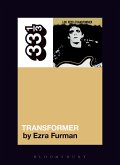Hangin' Tough, the second album by the New Kids on the Block, has sold more than seventeen million copies worldwide since it was released in 1988. But the album and the band have also been dismissed, derided and deemed uncool by the music establishment.
Almost thirty years later, the New Kids still perform the songs from Hangin' Tough.Hundreds of thousands of grown women still flock to their concerts to hear-and go bat-shit crazy for-the songs they first heard when they were teenagers. Is this mere nostalgia or can the science of music help explain the enduring success of Hangin' Tough? What is it about this album that made it so special? Is the music any good or are there other factors at play too?
Journalist and New Kids fan Rebecca Wallwork sets out to analyze the quality of Hangin' Tough with the help of music cognition experts, critics, producers and music industry pros. This is not a story about crazy fans, boy bands and truckloads of cheesy merchandise; it is an exploration of a watershed album and moment in pop culture history. It is a glimpse into the brain of not just New Kids fans, but into the minds and hearts of anyone who loves music.
Hinweis: Dieser Artikel kann nur an eine deutsche Lieferadresse ausgeliefert werden.
Almost thirty years later, the New Kids still perform the songs from Hangin' Tough.Hundreds of thousands of grown women still flock to their concerts to hear-and go bat-shit crazy for-the songs they first heard when they were teenagers. Is this mere nostalgia or can the science of music help explain the enduring success of Hangin' Tough? What is it about this album that made it so special? Is the music any good or are there other factors at play too?
Journalist and New Kids fan Rebecca Wallwork sets out to analyze the quality of Hangin' Tough with the help of music cognition experts, critics, producers and music industry pros. This is not a story about crazy fans, boy bands and truckloads of cheesy merchandise; it is an exploration of a watershed album and moment in pop culture history. It is a glimpse into the brain of not just New Kids fans, but into the minds and hearts of anyone who loves music.
Hinweis: Dieser Artikel kann nur an eine deutsche Lieferadresse ausgeliefert werden.
Making the case for the slick-sounding album's place in music history seems a considerable undertaking. Yet author Wallwork presents more than enough plausible evidence about the band's place in pop culture through research and interviews with those who worked with the boys during its heyday. She aims to explain why this album still resonates with her and the band's mostly female audience (now in their 40s), and she tackles her subject on multiple fronts: the science, particularly the psychology, of why music from people's teen years sticks with them well into adulthood; the genius of the band's creator, Maurice Starr, who was also responsible for its music; and the personalities, talents, and musical influences of the five band members. In some ways, this book is not so much a band biography or album history as it is a story about fandom. Even elitist rock fans who don't remember the New Kids fondly will find that Wallwork's work may crack their hard, cynical shells. Kirkus Reviews








